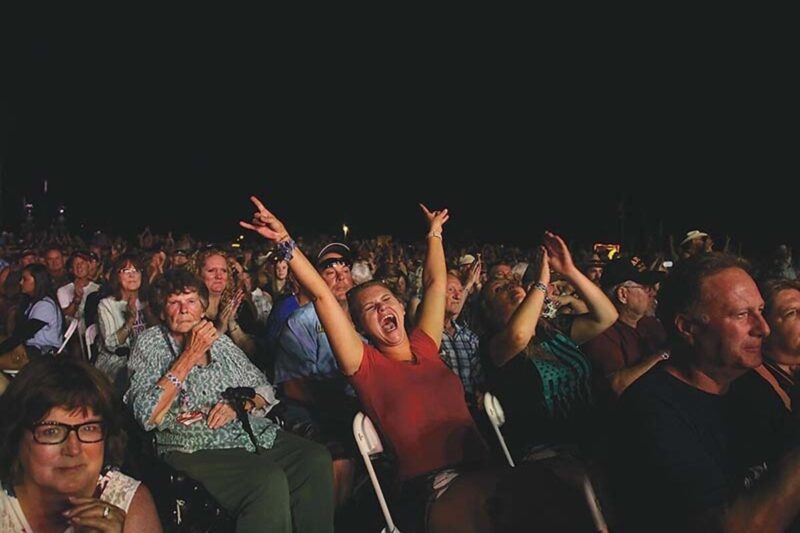While it is clear that the Oregon Jamboree country music festival made money this year, organizers aren’t ready to divulge exact amounts.
Board members for the Sweet Home Economic Development Group, which has staged the festival for the past 28 years, learned that proceeds are higher than last year’s during a report by Finance Committee Chair Heather Search.
Although she said it was premature to cite exact figures, profits this year are 90 percent over last year.
“I’m really excited about that,” Search said. The festival’s bank accounts are 120 percent over last year, she added.
She said that although some expenses were still coming in, they had already been reconciled into the financials.
“I’m pretty happy the way things are going.”
Search said finances for the 2019 festival were being wrapped up, a result of changes in the way the festival’s finances are being handled. She said the changes also result in a “better picture during the event.”
“I think, moving forward, we’ll have a really good, quick way to get finalized on numbers after the event, instead of waiting six months.”
“We did it really quick,” she said of the bill-paying. “It’s not two months or three months.”
Shamek said this is the first year in his four-year tenure at the helm that he has actually made contact with creditors to pay bills.
Chairman Ron Moore said that the accounting changes made comparisons between this year and last “apples to oranges,” but “next year we should be able to compare ’20 to ’19.”
But, he added, “the reports we got during the event were what we needed. We knew things were moving in the right direction. Obviously, we didn’t have solid numbers, but we knew the numbers were headed where they needed to be.
“It was a great year.”
Jamboree Festival Director Robert Shamek said this year was the first in which “I actually started reaching out to people early, saying, ‘Hey, I need an invoice. I want to get you paid right away.”
Shamek reported on other Jamboree activities, noting that the Jamboree has provided musical entertainment at the Oregon Veterans Home for five years and this year did so for the Brewfest in Lebanon as well.
He said the Jamboree is working on a “Music and Brews” festival for next spring in Sweet Home.
Board member Crystal Kimball, who is also involved in the Brewfest, thanked Shamek for the Jamboree’s help.
“It was the best music lineup we’ve had in the five years we’ve done it,” she said.
Shamek said he’s also working on the Mystery Concerts for next spring.
He said SHEDG would be presenting a “nice-sized” check to SHOCASE, which is fund-raising to purchase new curtains for the Sweet Home High School Auditorium stage.
He said the Jamboree would be putting a schedule together for announcing artists, following the announcement, during this year’s festival, that Old Dominion would be a headliner next year.
Moore said he is working with the Chamber of Commerce and the city to see whether there is a possibility for SHEDG and/or the chamber to collaborate with the Sweet Home Active Revitalization Effort (SHARE) to create a “Hub” entrepreneur and remote worker facility in the former City Hall building, modeled after the Foundry in Corvallis.
He said Shamek is producing a “wish list” of the space and facility requirements SHEDG would need to consider establishing itself as an “anchor tenant” with the entrepreneurial and remote worker options that would be available.
He said he attended the August chamber board meeting, held at the old City Hall, “which kind of threw some chamber board members for a loop because they weren’t really prepared – they thought they were moving there.”
Moore said he isn’t sure it would be feasible for both the chamber and SHEDG to occupy the building as anchor tenants, along with the “Hub” activities, “based on how the building is set up and what the different needs are,” but he said SHEDG should look at four options: Jamboree/SHEDG as an anchor tenant with the “Hub,” the chamber and visitor center as an anchor tenant with the “HUB,” a “HUB” standalone, and a combination of all those players as anchor tenants.
He said more discussions would be forthcoming.
SHEDG’s focus continues to be on developing the former Knife River quarry property into a festival site and headquarters for the organization, Moore said, “but I think it’s important for us to continue to support it, one way or another. My support right now is, ‘Here’s what we need. If you can develop something that we think can work, then we can move forward with presenting to City Council, if it makes sense.'”





